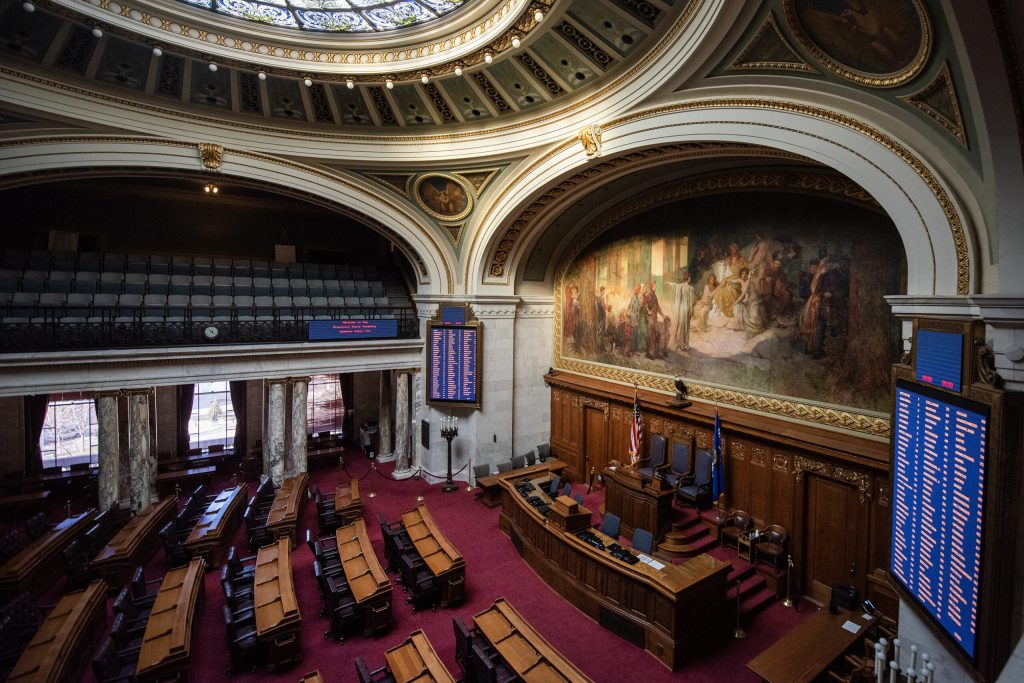After Years of Controversy, Assembly Recognizes Black History Month
Once a routine practice, the Assembly has not passed the resolution since 2020.

The Wisconsin Assembly Chambers has an abundance of artistic detail maintained by decorative painters and conservation technicians Thursday, Dec. 14, 2023, at the Wisconsin State Capitol in Madison, Wis. Angela Major/WPR
For the first time in years, the Wisconsin State Assembly formally recognized February as Black History Month — during the month of February.
The once-routine governmental declaration has faced controversy recently in the GOP-held Legislature. Its successful passage Wednesday — during an Assembly session otherwise devoted to education legislation — comes as the federal government has begun limiting recognition of cultural heritage months in some spaces.
It also marked the first time the Wisconsin Assembly has passed a Black History Month resolution in the month of February since 2020, although that proposal went nowhere in the state Senate. Two years ago, both houses of the Legislature passed the resolution in late March. Last year, the resolution didn’t come to the floor for a vote at all.
On Wednesday, the Assembly voted to acknowledge Black History Month in honor of 14 Black Wisconsinites “for their contributions to the state of Wisconsin, the country, and their fellow citizens.”
“Black history is alive in the work we do today in the fight for equity, in the demand for fair policies, in the commitment to ensure that future generations inherit a nation that truly lives up to its promise of liberty and justice,” Rep. Sequanna Taylor, D-Milwaukee, said from the floor.
These kinds of resolutions typically pass with little fanfare. But in 2019, Republicans who control the Legislature objected to the inclusion of Colin Kaepernick in the resolution, which is endorsed by the Legislative Black Caucus.
The Milwaukee-born Kaepernick played in the National Football League but became as well known for his activism against police violence. Many conservatives took issue with his advocacy, and Wisconsin Republicans in 2019 refused to pass the resolution with Kaepernick’s name attached. That year, GOP lawmakers voted to have it removed despite pushback from Black lawmakers.
The following year, Rep. Scott Allen, R-Waukesha, proposed his own resolution including several white people for commemoration alongside the Black people proposed by the Legislative Black Caucus. That draft received a sharp public rebuke from some of the Legislature’s Black lawmakers and Allen later withdrew the resolution.
The resolution didn’t move forward again until 2023, when it finally made it to the floor with some Republican co-authors, but was not voted upon until late March. Last year, a Democratic-authored resolution had two Republican co-sponsors but was not brought to the floor.
In a statement Wednesday, Rep. Supreme Moore Omokunde, D-Milwaukee, referred to the “challenges we’ve had in previous” sessions.
“Black History Month is ultimately about presentation, it’s about the presentation of the Black history you learn all year long, not just in one month,” he said.
This year, the resolution “extends appreciation” to community and state leaders, doctors, entrepreneurs and activists, including Paul Higginbotham, the first African-American judge to serve on the Wisconsin Court of Appeals; Marcia Anderson, a Beloit native who became the first African-American woman to become a major general in the United States Army Reserve; and Shakita LaGrant-McClain, executive director of the Milwaukee health department.
“Black history is not about our past, and it did not start with slavery, nor will it end with the cutting of DEI,” said Taylor, the Milwaukee representative, on Wednesday.
Taylor was referring to President Donald Trump’s executive actions to curtail diversity, equity and inclusion programs. That’s led many federal agencies to cancel their acknowledgements of February as Black History Month. The Department of Defense declared “Identity Months Dead” last month.
That same day, Trump himself issued a proclamation recognizing Black History Month.
It remains to be seen whether the state Senate will also take up the resolution.
After years of controversy, Wisconsin Assembly recognizes Black History Month in February was originally published by Wisconsin Public Radio.
If you think stories like this are important, become a member of Urban Milwaukee and help support real, independent journalism. Plus you get some cool added benefits.





















